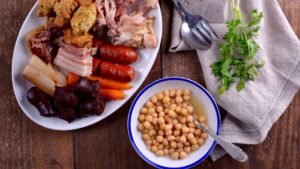
Cocidos comiendo cocido
Listen to the song here
At LVV one of the things that matter most to us is contact with the real language and its uses. We do not believe that everything is learned from books, but it is important to learn from real life as well. And what better way than through music? A. Cheeze, DJ Swet, Escandaloso Xpósito, and Jay Calabria are the creators of Cocido’s, a song that combines Spanish urban culture and art.
In this post, you can listen to the song, read the lyrics, and understand some of the expressions that are used in Spain. There are more words and expressions that are not explained, you dare to find the meaning?
(A. Cheeze)
Vamos cocidos por Magerit
Con un beat de Calabria en repeat
Resuci-tando al día siguiente como Cristo
26 años de mi vida con lo mismo
A esos wack rappers yo los dejo en visto
Fui más inteligente alguna vez que listo
Mami me lo advirtió
A ella le debo mucho más que al puto game
Nunca he pasado hambre, hubo caldo pa’ comer
Maté a mis mitos en mi MP3
Me los comí como croquetas del día después
Iba cocido y me quedé sopa
Hasta las cejas but still a fucking Glober Trotter
Watch me!
Aprovechando hasta la última gota que queda
Salgo del keli con el alma nueva
Y Hugo sabe que por muchos los caldos que cate
Ninguno me sabe como el de mi abuela
Love ya
Tu nieto está haciendo esos billes tranquilo
Como la foto de mi padre que parece un Beatle
Sensación de que te llena son garbanzos fritos
Hay cosas que me importan mucho más que el chito
Un amor pa’ mi vieja y mi tía. Sí, vamos al día
Pero hay caldo del día en la mesa, and that’s all…
All… What really matters baby
To’ cocidos por tu Area Code
It’s going down…
(Escandaloso Xpósito)
Domingos de cocido
Y toda la tarde vagueando con los primos
La abuela Florinda sorprendiendo con sus guisos
Valeriano sabe lo que no está en libros, huimos de Cristo
Cambiando cromos en Quintana
Fuimos libres como pistola sin bala
En nochebuena cenábamos en pijama
La calle Alcalá siempre tan almidonada
La florista viene y va, descamisada
Caminatas desde Pío hasta Malasaña
Quítame este puto frío y dame más castañas
Creo en la magia y en el “abracadabra”
Soy Escandaloso y chulería es esto
Siempre con el Harto y con el Pavi por el centro
Sientes lo que canto y el deja vu del momento
Siempre es de más, no cuento el vuelto
(Estribillo)
Siempre cocido comiendo cocido
Siempre cocido comiendo co-cido
(x2)
(Escandaloso Expósito)
Y es que les falta un hervor… Como a garbanzos
(A. Cheeze)
No estamos a la sopa boba, nos estamos regalando
(Escandaloso Expósito)
Veo muchas cajas tontas. Os estamos embalando
(A. Cheeze)
Comiendo chori mientras tanto
Mi vieja lo cocina y le reza al santo
(Escandaloso Expósito)
Un tiempo fui vegeta, pero ya no me renta tanto
(A. Cheeze)
No estoy pidiendo el aguinaldo, motherfucker…
(A. Cheeze & Escandaloso Xpósito)
Me estoy jalando este cocido del quince
(Estribillo)
Siempre cocido comiendo cocido
Siempre cocido comiendo co-cido
(x4)
(Escandaloso Expósito)
Siempre cocido comiendo cocido
Escuchando el organillo y comiendo un barquillo
Madrid es Castilla…
Quintana
Cocido is a type of Spanish food. It is made from chickpeas, broth, and different types of meat and vegetables.
The expression ir o estar cocido/a in Spanish from Spain means to be drunk and it can also mean to be very hot when we use it with the verb estar.

Pa is a colloquial abbreviation of the preposition para. It is written with an apostrophe if it is followed by another word.
More examples of this type of abbreviations are na (nada) and to (todo) Remember that they are used in informal contexts.
Quedarse sopa or estar sopa is an expression that means to fall or be asleep. The broth of the cocido can also be called soup.
Faltar un hervor is an expression that conveys that something or someone is not ready for something, that it needs to learn or finish training. It can be used in a pejorative way when we believe that a person is not smart enough. For example: Este chico es tonto, le falta un hervor.
La sopa boba was the soup cooked in the convents with the leftovers of the stews and distributed among the poor. The expression vivir de la sopa boba is used to describe someone who lives doing nothing and at the expense of another person.
Sign up for our classes and learn much more about the language, culture and history of the Spanish-speaking world.
